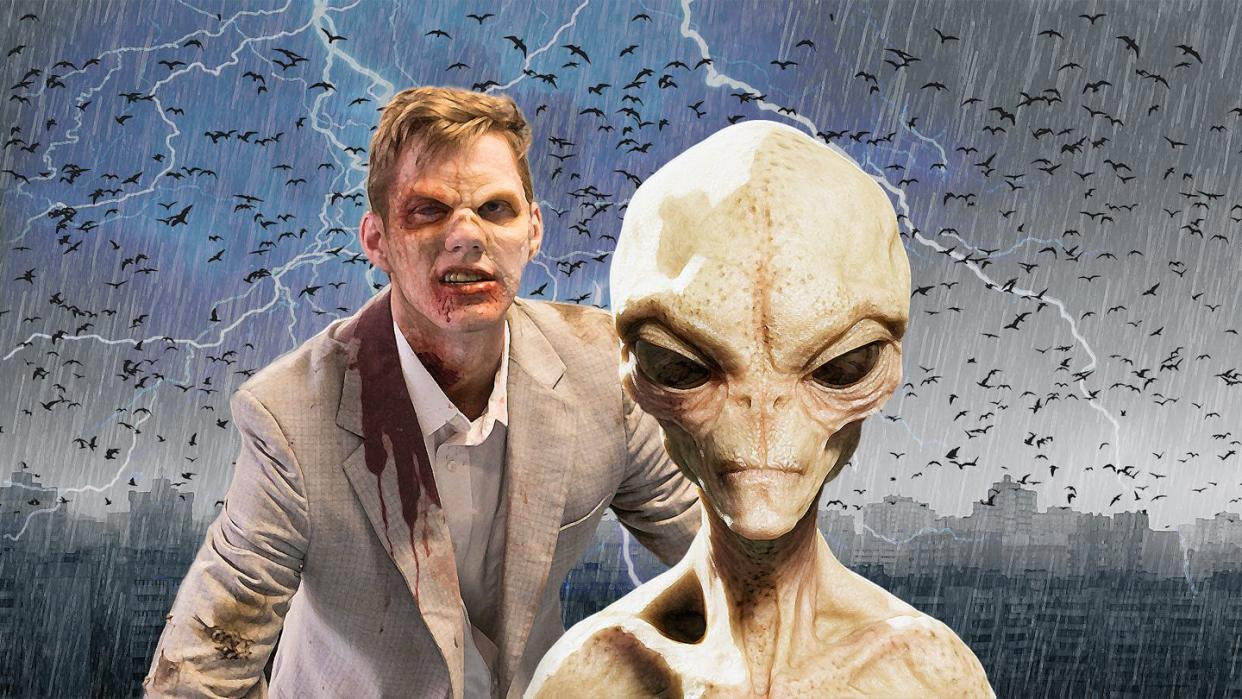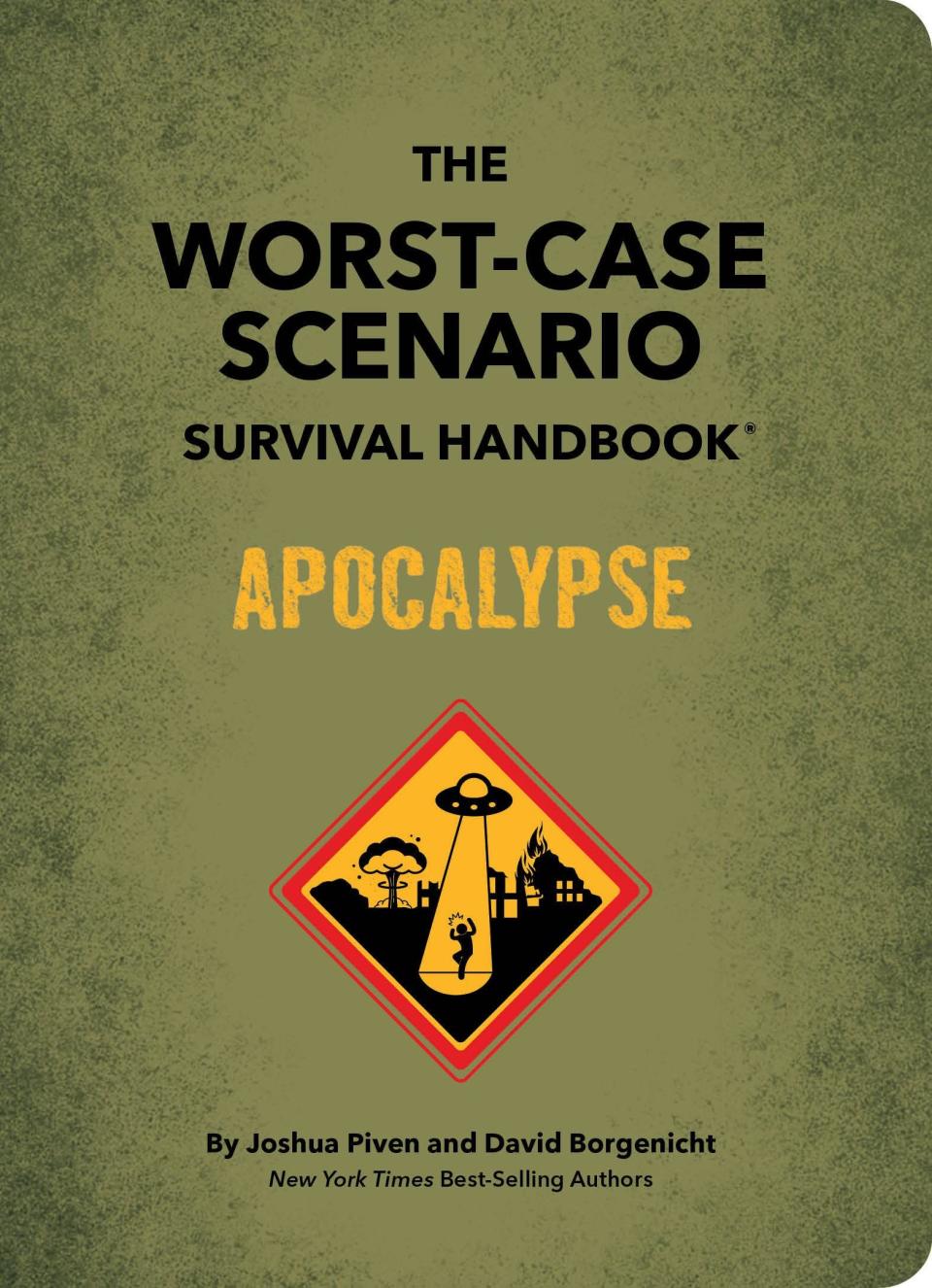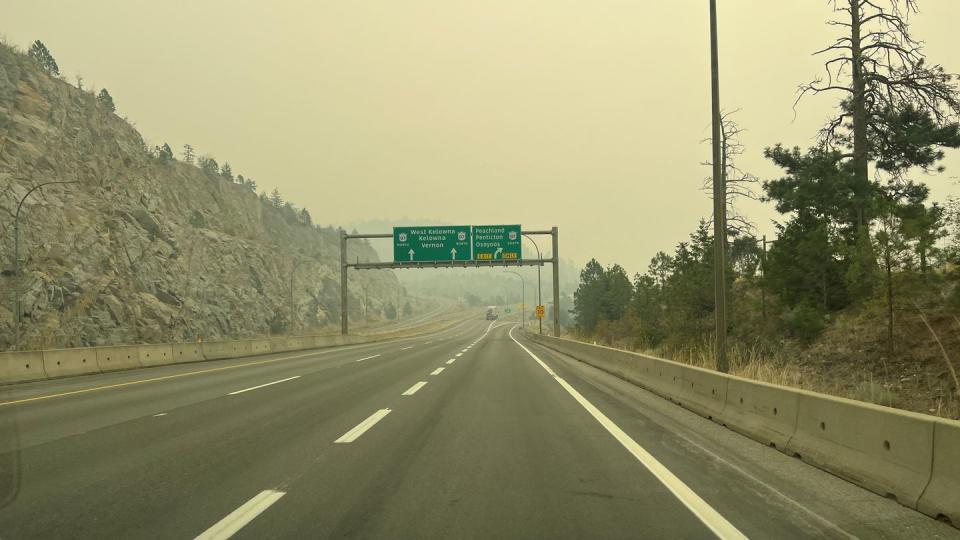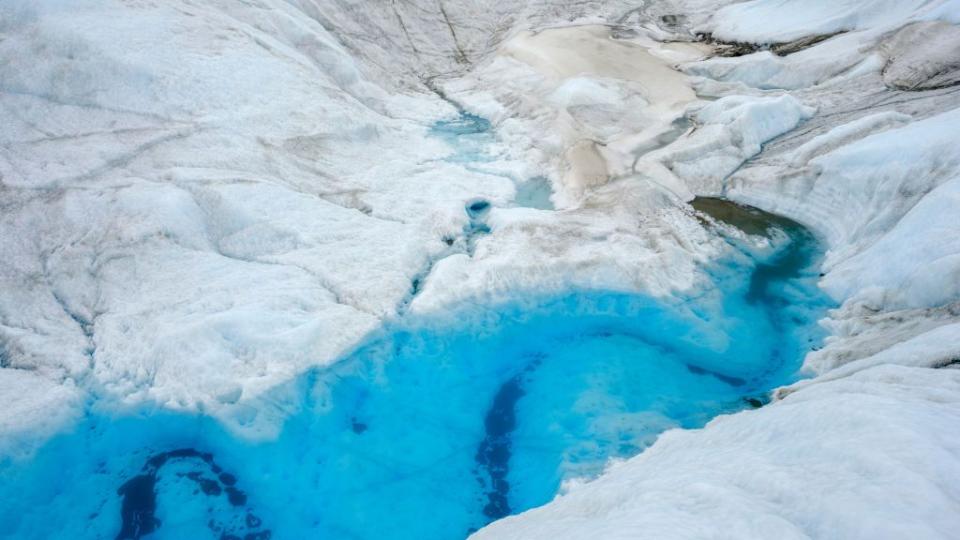Even You Can Survive the Apocalypse. Here’s How.

"Hearst Magazines and Yahoo may earn commission or revenue on some items through these links."
I've got good news and bad. Bad first: the apocalypse is coming. We've got climate change, pandemic disease, AI, Mike Johson as the Speaker of the House, comets (probably), and Hollywood seems to only be doing remakes these days. Now the good news: There's a new book out that will teach us how to survive it. Wouldn't it be great if that were the case for all the disasters humanity faces?
We talked to David Borgenicht and Joshua Piven, authors of 1999's hit novelty book that taught me everything I know about how to scare bears away, The Worst-Case Scenario Survival Handbook. They're back now with a new masterpiece, The Worst-Case Scenario Survival Handbook: Apocalypse which covers all manner of misfortune from flood to alien invasion. We talked about not just what to fill our bunkers with, but how to thrive inside them. This interview has been lightly edited for length and clarity.
Esquire: Pretty scary that you've decided to put this book out now, as opposed to say, after I, personally, am dead. Is there something you know that we don't?
David Borgenicht: I mean, look I grew up in the '70s and '80s under the threat of the Cold War and nuclear winter, and so I've always sort of felt like we're a couple of seconds from midnight anyway. We just don't often realize it. We choose to compartmentalize it and ignore it. That threat has certainly not gone away, and other existential threats have come more to light over the past several years — especially since Covid. And now we've got continuing war happening in the Middle East and in Ukraine and nuclear threat reappears. And then, of course, climate change, and then of course, AI.
So, if we were seconds away from midnight back in the '70s and '80s, we're probably even closer now. We're not trying to be doomsayers or depressing here, or force everyone to be preppers. We actually write these books out of a lot of hope that we can actually survive. They are survival manuals, right? Our hope is that it's actually going to make people feel a little bit more calm and maybe also realize how precarious our civilization actually is and start to think about reversing these things a little bit.
But I don't think we know anything secret about what's coming down the pike. It's more just like how much longer are we going to wait before we start to try to reverse the clock?
That was quite the menu of possibilities for the apocalypse you just listed. What do you think is the most likely scenario?
Joshua Piven: I definitely have a concern about AI, like most people. I think if you had asked me in the beginning of 2020 when we were all in our homes and were like "this is it, this is the beginning of the end," when we didn't know the morbidity of the virus, that definitely felt different. Had the morbidity been significantly different it could have been a lot different! Obviously millions people died. It was horrible and is still horrible. Covid took what we thought of as being highly unlikely or even fantastic and made it real. So I think I definitely worried then about the next one — the next pathogen that's even worse, more transmissible, more morbidity. That is definitely something that's concerning to me.

The Worst-Case Scenario Survival Handbook: Apocalypse
amazon.com
$18.99
I'm less concerned about the aliens invading. Of course, we know they've already been here but the government is covering it up.
Yes.
Piven: I'm a little bit less concerned about that. But climate change obviously is the existential risk. [Time was] when it seemed like it was 15 or 20 years in the future, it doesn't necessarily feel like that to me anymore. Having said that, we are a very resourceful species, and I think we will adapt in some way.
That said, I read an article from Bill Nye that said he's least worried about AI and most worried about solar flares taking us out.
I don't think I know what solar flares are?
Piven: Coronal ejection, right? It's like an electromagnetic pulse. It would take out the telecommunication network, fry the satellites, disrupt the electrical grid. But even that, while it would be bad, I think we would rebuild in the same way that a super volcano — which we cover in the book — could cause mass casualties and wreck infrastructure, but eventually I think it would be built back. We're already seeing this. I mean, look at Acapulco! 200 mile-mile-an-hour winds that took down the power lines, blew out the windows. It's horrible and terrible, but assuming the funds are there, they'll rebuild.
How do you define "apocalypse"? How do we know if we're in one and it's time to whip out the book?
Borgenicht: It might be too late if that's the first time you're whipping out the book. I guess our hope is that because the books are a mix of real information — it’s all real information, but likely and less likely situations — they’re meant as entertainment as much as they are meant as true survival manuals.
Is your lawyer making you say that?
Piven: Did you read the warning/disclaimer at the beginning of the book?
I did, yes.
Borgenicht: Yes, this is by no means a replacement for your own common sense and knowledge.
Okay, but back to my question, how do you know it's the apocalypse?
Borgenicht: I would say it's gonna feel like the apocalypse when the streets are empty and you see dead birds everywhere.

What happens to the birds?
Borgenicht: You know, they've either died due to radiation poisoning or some biological event. We've all seen all the movies. We don't exactly know what it is that's caused it, but I think there's no sun, it feels bleak, and there are a limited number of humans to interact with or see. They've been taken out by something. I think then it's gonna feel like the apocalypse. As long as there are lots of us around to help each other, entertain each other, it's going to be ok. But once half of us are gone...
Piven: It will look like Silo on Apple TV. If you haven't watched that show, you really need to.
My mother-in-law loves it. This makes me wonder what your reference texts are for visions of the apocalypse. Silo, it sounds like, is one of them.
Borgenicht: That comes mostly from pop culture in my mind. Obviously, we haven't really experienced it yet. When we were doing the outline it was everything from The Road to Mad Max to The Hunger Games to District 9.
Piven: V from the '80s.
Borgenicht: Every zombie movie we've ever seen. 2001: A Space Odyssey. There have been a number of books written over the years that talk about what's going to happen. Ted Koppel wrote a book called Lights Out which is about what happens when the grid goes. He was ahead of his time, I guess. Really, it's the whole zeitgeist of apocalyptic fiction and nonfiction and the potential existential threats of it all. I listen to too many podcasts about these things lately. I started during Covid.
The first book came from some of those same places. It came out in '99 and it was at least unintentionally in our heads because of Y2K which was about to hit and the grid was going to go down then. But really it was triggered by an article that I think I remember being in Esquire, in which a passenger described what he did to try to land a plane.
Yes, it was Esquire.
Borgenicht: The article describes step by step what he does to land the plane. [Editor’s note: The article we think he’s remembering is “How to Land a Plane.”]
That was a moment of crystallization, a moment of epiphany, that all these things that I had seen in disaster films and action movies and read about in the news, that there were people in the world who actually knew what to do in those horrible situations. That inspired the first book. Something between pop culture and the demise of civilization.
That's a powerful thing. To think that you could be in charge of your own salvation.
Borgenicht: I think that's partly why we love these movies. You see these action movies and stars in fictional stories survive these ridiculous situations, and I used to file that away, and found it inspiring to see James Bond get out of this situation for the umpteenth time. I do think you're right, that's part of why the series is still in print and is still resonating. Because it does lowkey make everybody feel like they're James Bond or Indiana Jones or Lara Croft or Bear Grills.
I was surprised I wasn’t more stressed out while reading the book. It made everything feel so simple that even I could do it.
Borgenicht: Initially when Josh and I started writing these books the first iteration of them we had kind of a setup to explain why you might be in that situation, and then we gave you the instructions. It was much more narrative. Our original editor, Jay Schaefer at Chronicle Books — who was like a huge anxious worrier and so this was the perfect book for him to acquire back in the day — he really said, "No, you don't have to explain it, just give people the instructions. Let's just assume they need this information."
There are many instances in the book where you say a lot without saying very much at all. Like you suggest making a bunker, and then say to only leave it at night. Who do you imagine we're hiding from during the day?
Piven: Either a zombie or your nosy neighbor. One or the other. I f you have the bunker, don't talk about the bunker because you don't want your neighbors to know about the bunker. Like Fight Club.
Borgenicht: You don't want your neighbor to knock on your door right as the asteroid is about to hit. There's only so many people you can fit in the bunker. So make sure you're stocking it at night.
There were some nice design tips in there for the bunker.
Piven: Mirrors, lucite shelving. It's all about the lucite.
Let's say I'm in the bunker, I've survived the initial blast. How do I know when the apocalypse is over and I’ve successfully survived?
Piven: There is a section on how to know if it's safe to go outside. We do talk about that. There's reference to birds falling out of the sky and is the air breathable?
It's kind of a philosophical question, too: Would you want to live in your bunker if that was all there was? Is that really living? Bunker living? I don't know that I would necessarily want to do that for fifty years, even with the imperative that we want to continue human society. I think you would have to have some means of checking the surface or at least getting information, whether it's over the radio or getting simple messages like "it's ok!"
Biological I think would be the most difficult [scenario to survive]. Radiation attenuates over time, chemicals disperse in the air. Those probably wouldn't be as long-lasting. Hopefully you have some way of communicating with other people. We do talk in the book about how to connect with other clans and how to signal and use a ham radio. I think the ham radio would be a valuable item if you were stuck in your bunker. But I also think it's different if you're talking about one of these $2 million bunkers versus a little safe room below your basement.

Speaking of $2 million bunkers, you say there's a fine line between being a prepper and being reasonably prepared. Can you talk about that?
Piven: Don't talk about zip ties.
Borgenicht: I don't know that there's anything wrong with being a prepper per se. I think everybody should be prepared to some degree for an emergency situation. How would you handle it if you actually were evacuated for some reason from your home and you only had 30 minutes? It would be good to know where your passport is and your papers are, it would be good to have a go-bag that's basically ready: with a water bottle, with some emergency supplies like a multi-tool, purification tablets, whatever it is that might help you.
But it's funny, people who live in nice urban areas tend to look askance at preppers probably. But when things go down, they are going to be prepared. They might seem crazy now and they might, in fact be crazy, some of them, but they also are the ones who have stockpiled supplies. And the power dynamic is gonna shift.
Is there any way to know that you've crossed over into crazy territory?
Borgenicht: I think it's that the paranoia and fear are your first reaction. When you fear others. I think it's ok to use fear as a motivation to get prepared and to do something active and positive, and that's pretty much what the books say and hopefully inspire. But I think for people who are super anxious, super fearful, and therefore highly emotionally reactive and fearful of others — maybe even harmful to others — that's the path to destruction.
Really, we know the only reason we built all this in the first place is because we figured out how to work together as humans. If we use that fear and paranoia to drive us further apart, I think that's when you've tipped over the edge.
You guys are really optimistic for people who think so much about the apocalypse. Where does that come from?
Piven: As Dave mentioned, they are survival books. There's this great book by Julie K. Norem, Ph. D called The Positive Power of Negative Thinking and she actually has studied people that tend to be negative thinkers, and actually finds that they are in many cases better prepared for things because they gamed out every possible negative thing that can happen and nothing is a surprise, which is part of the preparation. Be prepared, right? If you've gamed out some of these things, then presumably maybe you won't panic as much when they actually happen.
People always say "are these books serious? Are they humorous?" And our answer is usually "Yes." They're both. It's real information for unlikely scenarios and esoteric information for likely scenarios. It's a combination of those two things that have maintained the books' popularity but also have helped us focus on well, what are the actions you can take to survive some of these things? You saw we have a section on staying positive and controlling your emotions and controlling your attitude, which in many cases is the only thing you really have control of in these crazy situations: controlling how you react to things.
You can't seriously expect me to survive the apocalypse on breathing exercises.
Piven: Well, you know, meditation and working out does help focus the mind. Laurie Santos, who we talk to at Yale, she was really helpful. She was like, this is what you gotta do. You gotta maintain your focus on being positive and sometimes that means giving up control and realizing that you can't control everything.
Borgenicht: While a positive attitude and breathing exercises are not going to save you on their own, they might save you from making a fatal mistake by panicking and overreacting. It might just be because I'm Jewish and my grandfather always told me, “you have to laugh or you're screwed”— like when we were talking about any horrible disaster that's happened to him personally or to Jews in general. I think there's something very powerful about laughter and staying positive that I think actually short-circuits the fear reaction. Fear is involuntary but so is laughter. Someday I'm gonna figure out the connection there. But I believe that maybe the positive attitude is in fact the thing that can save us.
I like the section on utopia. Let's talk about your visions for utopia.
Piven: That's a fun one. Rebuilding society, right, so we're post-apocalypse now. What do we want? What do we want to rebuild? I'm pretty sure it's not what we have right now because that doesn't seem to be working too well.
I think we kind of have to go at this from a number of directions: What is the community like? What are the rules like? The constitution — for lack of a better term? We talked to somebody who studies social formations and a bunch of academics who study how to write a constitution. But also, how do you assign duties to people? How do you make everybody feel useful? Not everybody can do every thing. How do we create a better community than what we had before? And is it realistic that that would continue for millennia? I'm not sure but I do think you have to have a starting point, and that's what we tried to get at. Presuming you're at a point where you're not being attacked by rival clans constantly and having to defend yourself, you can actually form some sort of government, some sort of cooperative society.
My family, we're not Quakers, but we have a kind of Quaker commune thing going on in Western Pennsylvania, and I think some of that informed some of the writing of the book. Because a lot of it is governing by consensus, and people doing the work that they're capable of doing, but not an expectation that you have to do a job that you're not capable of doing. And there has to be no resentment of people doing more than other people. Which I think can be part of the human condition — anger or jealousy if it feels like the work isn't evenly distributed.
"From each according to his ability, to each according to his need."
Borgenicht: I didn't want to say that. Something like that, but maybe it's socialist more than Communist. A little bit of private ownership.
This book definitely has a little more of the social and the psychological elements than some of the previous ones did.
Speaking of -isms, there was some feminism in there, I noticed. As a parent, I appreciated the mention of childcare in your utopian society.
Piven: Yes, it's very important.
Borgenicht: Ultimately in my mind it's about simplicity and collaboration or peace and wellbeing over all. I think those things all have to go together. It's almost a return to a more tribal way of living—not in a negative way, but in a positive way, where it's communities, everybody playing their role, but nobody's trying to get richer. We're all just trying to make sure that we're all peaceful and calm and healthy.
Do you think it will take an apocalypse for us to reorient society toward that utopia you just described?
Borgenicht: You know, it might, sadly. There's a lot of waking up that needs to happen, I would say. I hope it doesn't take that. My true hope is that the vision of the future that we make happen for humankind is most like Gene Roddenberry's Star Trek vision of the future, where we've used technology well to solve all of basic needs and now we just get to explore and learn about the universe and ourselves. That's still possible. We keep inventing things that Star Trek envisioned. I think it's possible with the right regulations and motivations we can use our innovative technological invention capability to lead us to an existentially hopeful future. It's going to take some powerful minds both scientifically and politically—and maybe just some good humans to lead us down that path. Some Mr. Rogers-like figures who haven't appeared yet in this generation.
I forgot to ask if you have bunkers.
Piven: I can't tell you if I do.
You must have bunkers.
Borgenicht: No, I don't have a bunker. I have a 1989 Vanagon that's packed and ready to roll, though.
A what?
Borgenicht: It's a VW microbus. It's a camper van but a mini one. Like the old school VWs.
Esquire: Josh?
Piven: I have a remote location.
A remote location?
Piven: A remote location. A cabin.
That's a cool way to describe a second home.
Piven: It's in gun country. “Second home” would be charitable.
Home is where the heart is.
Piven: At least I have a place to go to. It has water.
Home is where there's at least half a gallon of water per adult per day.
Piven: We can hold out on the wild turkeys that run around and the tick-infested deer population.
Thanks guys.
The Worst-Case Scenario Survival Handbook: Apocalypse came out on October 31, from Quirk Books.
You Might Also Like

